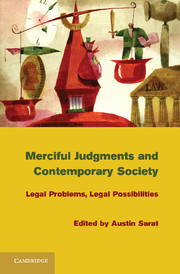Book contents
- Frontmatter
- Contents
- Acknowledgments
- Contributors
- When Can or Should Legal Judgment Be Merciful? An Introduction
- 1 The Place of Mercy in Legal Discourse
- Commentary on Chapter 1
- 2 Mercy, Crime Control, and Moral Credibility
- Commentary on Chapter 2
- 3 Defending a Role for Mercy in a Criminal Justice System
- Commentary on Chapter 3
- 4 Actions of Mercy
- Commentary on Chapter 4
- 5 A Feminist View of Mercy, Judgment, and the “Exception” in the Context of Transitional Justice
- Commentary on Chapter 5
- Index
- References
5 - A Feminist View of Mercy, Judgment, and the “Exception” in the Context of Transitional Justice
Published online by Cambridge University Press: 05 December 2011
- Frontmatter
- Contents
- Acknowledgments
- Contributors
- When Can or Should Legal Judgment Be Merciful? An Introduction
- 1 The Place of Mercy in Legal Discourse
- Commentary on Chapter 1
- 2 Mercy, Crime Control, and Moral Credibility
- Commentary on Chapter 2
- 3 Defending a Role for Mercy in a Criminal Justice System
- Commentary on Chapter 3
- 4 Actions of Mercy
- Commentary on Chapter 4
- 5 A Feminist View of Mercy, Judgment, and the “Exception” in the Context of Transitional Justice
- Commentary on Chapter 5
- Index
- References
Summary
Introduction
Mercy is often characterized as outside the law and in tension with justice. On this understanding, to show mercy is to give a person convicted of crime less punishment than he or she deserves and/or less than the law requires. Mercy is unbounded by law, subjective, emotional. Seen in this way, mercy appears to be an exception in the sense developed by Carl Schmitt in his work on emergency powers: an arbitrary exercise of sovereign will or prerogative that marks the boundaries of the legal order and the rule of law. This chapter explores the implications of this analogy for issues of mercy in the context of transitional justice.
In the aftermath of civil war (or a transition from oppressive government to a more democratic one), where the limits of law and the chaos beyond its boundaries have been such a painful part of a nation's recent experience, the metaphor of the exception might seem particularly appropriate. But I argue that the metaphor rests on assumptions that are both flawed and inapposite as a basis for understanding mercy and should, therefore, be rejected. The model of the exception developed by Schmitt rests on three sets of assumptions. For each set, I explain the role of the assumptions in Schmitt's argument and criticize the assumptions either as inherently flawed or as inappropriate to an understanding of mercy or both.
- Type
- Chapter
- Information
- Merciful Judgments and Contemporary SocietyLegal Problems, Legal Possibilities, pp. 247 - 290Publisher: Cambridge University PressPrint publication year: 2011



